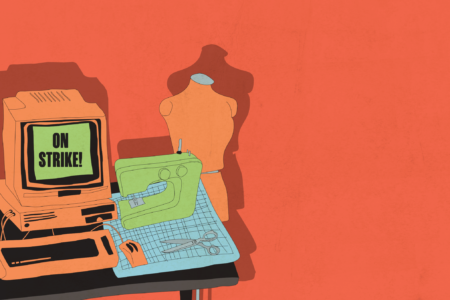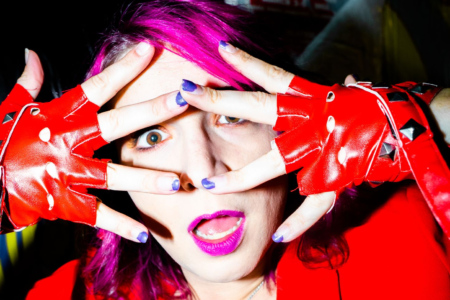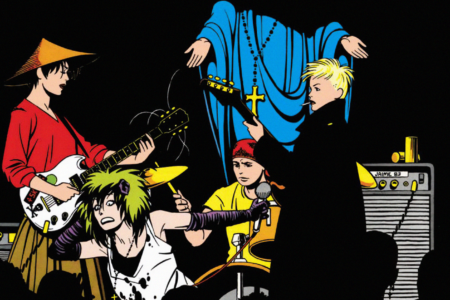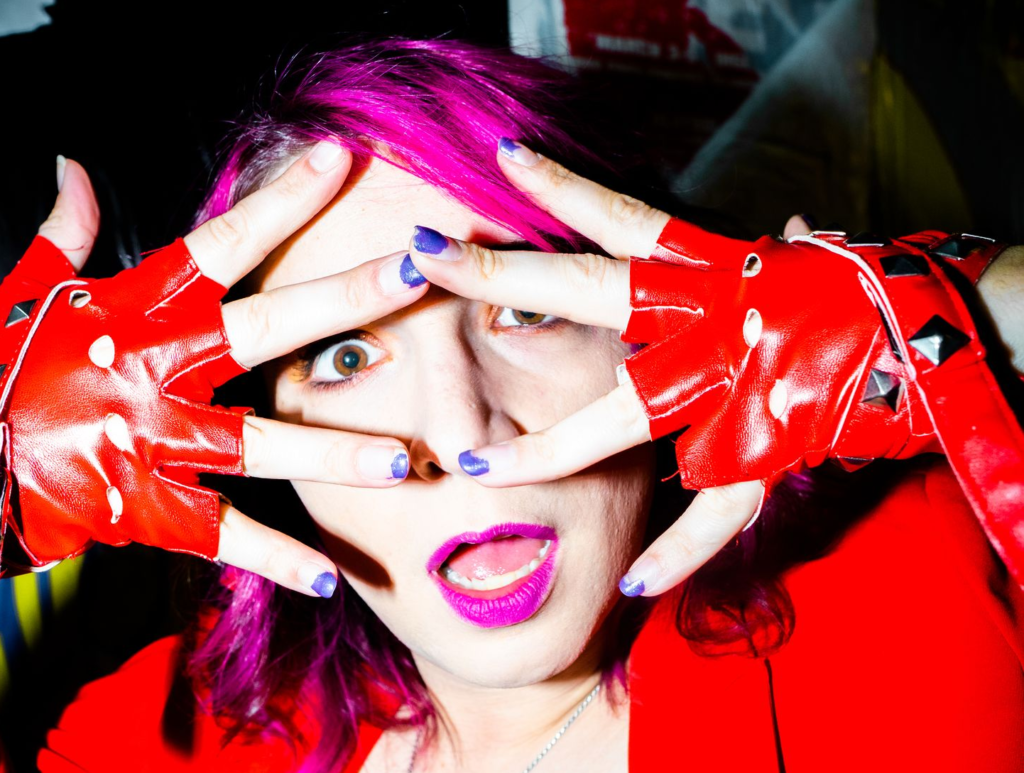
“Dear Todd Phillips,” wrote actor Tyrese Gibson in the top comment on the Joker director’s Instagram, “when you do these films, you take us into an out of body and outer head space… We are all beyond excited and over the moon that we get to see Joker2 -TG”
“I’m glad he’s excited,” director Vera Drew tells me over a call. We were reading responses to a picture of an ashen Joaquin Phoenix being shaved. “Maybe he’ll make his own Joker movie.”
It was the first conversation we had since the premiere of her own Joker movie, The People’s Joker, at the Toronto International Film Festival. Instead of a cynical, tortured origin story of the clown prince of crime, Drew’s remake is an unofficial, satirical, empathetic, autobiographical, trans coming-of-age film set in Gotham City. A Gotham where Bruce Wayne’s automated drones patrol for mischief makers and a nude, Lex Luthor-like Lorne Michaels rules over the comedy scene with an iron fist.
This was also the only public screening of the film.
Right before the debut Warner Bros., who hold the rights to Batman, Superman, Matter Eating Lad et al, intervened. The remaining showings at TIFF, and other festivals, were pulled. It caught Drew off guard, who only five days prior told me how quiet the major studio had been about her ragtag production.
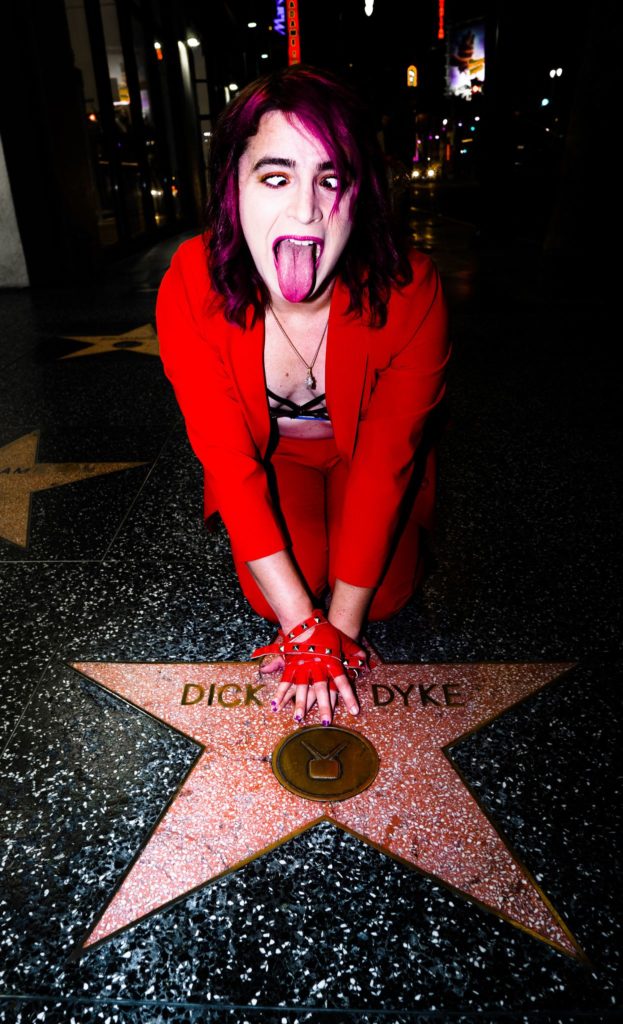 Despite rumours she was not served a cease and desist. Only a strongly worded letter in response to a screener viewed by Warner Bros.’ legal team. “It was actually kind of nice,” says Drew, “it said something to the effect of, ‘despite Vera having an interesting story to tell and doing a good job, they still felt that we infringed on their brand.’”
Despite rumours she was not served a cease and desist. Only a strongly worded letter in response to a screener viewed by Warner Bros.’ legal team. “It was actually kind of nice,” says Drew, “it said something to the effect of, ‘despite Vera having an interesting story to tell and doing a good job, they still felt that we infringed on their brand.’”
When Batman Forever was released in 1995, one of the most common playground criticisms of the film was that it was very gay. Even if they were intended as derogatory jabs at director Joel Schumacher, a braggadocious homosexual who never had a mean thing to say about the people he worked with, it likely affirmed to him that his mission succeeded. The repeated crotch zooms, butt zooms, the nipples, the introduction of a fully-grown adult Robin to live in Wayne Manor, the nipples, the Riddler’s drag-ready glitter and spandex, the nipples. Of course Batman Forever is gay.
“Why can’t there be a really gay and sweet and sincere Batman movie,” says Drew, “all the things you’d see in any other queer independent film.”
Like Bruce Wayne leaving The Mark of Zorro, Drew considers seeing Batman Forever on the big screen her own origin story. She speaks sentimentally of watching Val Kilmer’s Batman crash through Nicole Kidman’s window. Not wishing to be the caped crusader, but yearning to be Nicole Kidman in his arms. This childhood memory is the opening scene of The People’s Joker. When the film’s young Vera asks their mother about gender, they are whisked to Arkham Asylum to be overmedicated by Dr. Crane (The Scarecrow).
When Vera moves to the big city of Gotham, the comedy world is neatly divided into binaries. Sexually repressed, self-deprecating men get to be ‘Jokers’ while attractive female arm candy gets to be ‘Harlequins.’ Despite the streamlining, Vera feels like an ill fit. Befriending other aspiring comedians such as The Penguin, Poison Ivy and The Riddler, Vera starts an underground, ‘anti-comedy’ club in defiance of Wayne and Michaels. After striking up a romance with Jason Todd, a trans man resembling Jared Leto in 2016’s Suicide Squad, Vera begins to undergo her own transformation. Not merely into a woman, but a comedy menace the likes of which Gotham has never seen.
“We have a Joker with visible top surgery marks who never goes, ‘You want to know how I got these scars?’” says Drew. “Easy joke. But I guess I can’t make things easy.”
The parallels to Vera Drew’s own life are not subtle. She moved to Hollywood and worked on various Tim Heidecker and Sacha Baron Cohen projects. Some of these productions were for Adult Swim, owned by Warner Bros., making their retaliation more curious as she was never an unknown entity. She even discussed The People’s Joker with staff on the Harley Quinn show, an adult animated series that boiled its own hot water when press learned the studio wouldn’t allow Batman to perform cunnilingus on Catwoman.
More nuanced is the sincerity of the film. In a world of supervillains, superheroes, jokers and harlequins, The People’s Joker reemphasizes how redeemable people can be. Based on the Robin so reviled by fans they voted to kill him off in 1988, Jason Todd is a toxic partner. Despite helping Vera along in her self-discovery, how Todd ultimately fits into her life is a work in progress. Similarly, Vera’s mother, staggering but earnestly trying to understand her daughter’s new identity, is not a menace but a frustration. There is love and laughter in this Joker’s heart. The truest evils in Gotham City are those who abuse power at the greatest levels.
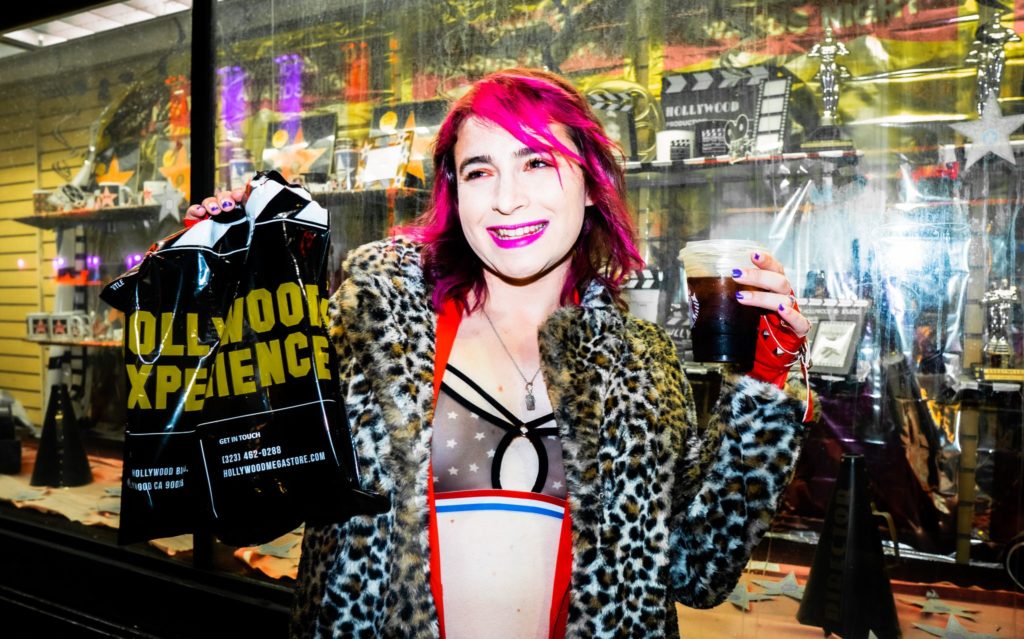
In 1991, Canadian band The Crash Test Dummies released ‘Superman’s Song,’ a eulogy mourning the type of upstanding, public project-believing idealist that Americans once lauded. The next year, DC Comics actually killed the guy. Clark Kent bloodied at the hands of Doomsday, a space ogre donning gym shorts and a skullet. Though revived, he has not been the de-facto comic book character since. Sometimes it’s billionaire industrialists like Bruce Wayne or Tony Stark. Mostly it has been the Joker.
Some fear worshipping a circus-themed, chaos-loving anarchist isn’t good for culture. In 2012, a Colorado showing of The Dark Knight Rises was attacked by a gunman with orange-dyed hair, killing 12. Despite pearl clutching, Todd Phillips’ Oscar-nominated Joker, more explicitly about acts of public violence, did not seem to unleash any in reality. Alternatively, Americans are a tacky breed and many may not engage with the notion of the Joker beyond ‘cool scary clown.’ But there is something amiss with America’s growing madness.
“I think in the ‘90s we all believed we could change the rot from the inside out instead of pulling things up from the root,” says Drew. “Every day we’re standing on the precipice of a major collapse. After 20 years of being let down by politicians, and I’m talking both sides of the aisles, everybody’s feeling strange.”
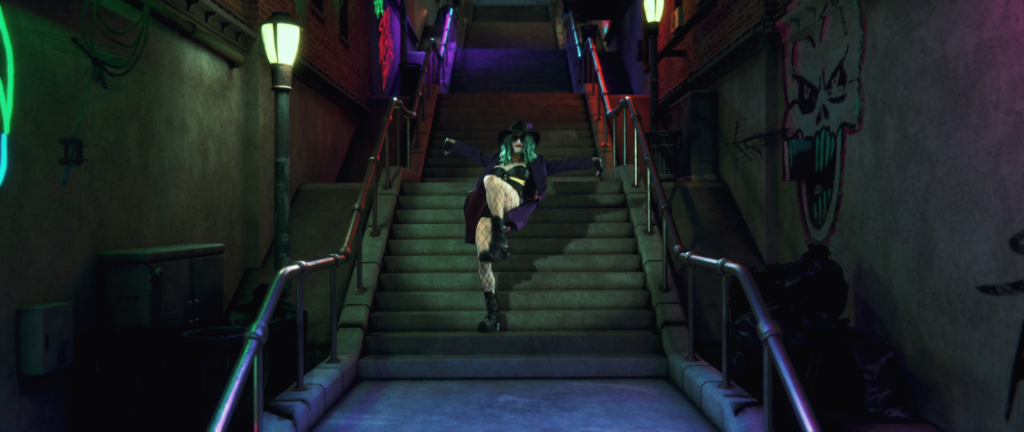
Drew is reclaiming the Joker. People are staring into the void and laughing. They are transforming. Transformation is necessary. Drew feels the character embodies the destruction that needs to happen before the rebirth of Superman. “I want the movie to show that destruction is necessary, but it can’t just be destruction,” says Drew. “We need to build.”
Drew didn’t enter The People’s Joker diagnosed with ADHD or practicing ‘magic with a ‘k.’’ In our first chat, before the premier and before Warner Bros. intervened, Drew remarked what a big influence Scottish comic writer Grant Morrison had been on her work. An anecdote about The Invisibles came up. Story goes that Morrison changed the tone of the series after finding that tragedies portrayed in the comics began occurring in their life. After subjecting the characters to Bacchus sex and drug indulgences, Morrison said their own life became a lot more chipper too.
The People’s Joker is autobiographical, but even plot points that weren’t true at the time of its production began to manifest.
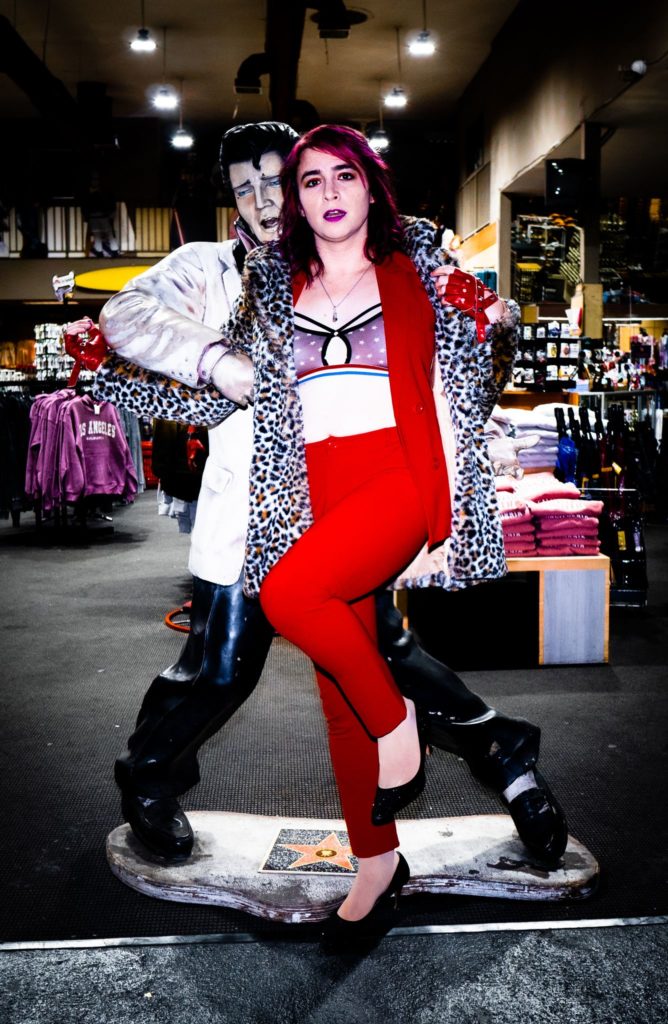 The day we met Vera Drew’s hair was freshly dyed, brightly green. She couldn’t stop using curiously Joker-ish terminology: ‘toxic sludge,’ ‘damaged comedian,’ ‘we live in a society.’ She says the Joker and Batman have always been a heavy part of her identity, but making this movie, originally something to be wrapped in a few months, consumed her through COVID.
The day we met Vera Drew’s hair was freshly dyed, brightly green. She couldn’t stop using curiously Joker-ish terminology: ‘toxic sludge,’ ‘damaged comedian,’ ‘we live in a society.’ She says the Joker and Batman have always been a heavy part of her identity, but making this movie, originally something to be wrapped in a few months, consumed her through COVID.
“I’m fully in Gotham City,” says Drew. “For two years I’ve been waking up to emails that read: here’s the Batmobile, does it look too much like a dick? The answer was no, make it look more like a dick. I’m sure Tim Burton’s given that note a lot.”
Discussions about intellectual property and the dwindling space for radical, queer art are key themes of The People’s Joker. Drew didn’t want them to be the primary conversations held about the film. Reality had a different plan.
“Every step of the way this project has felt like we’ve been robbing a bank,” says Drew.
“We premiered on a Tuesday. They waited until the end of day Friday before the weekend to ask for a screener,” says Drew. That first email from Warner Bros., said that they ‘needed to form an opinion.’ “Such a funny fucking turn of phrase.”
Even at this point, Vera was optimistic, simply because of how close things were to the premier. All through Monday Vera and her team sat on pins and needles. “We ended the day celebrating because we hadn’t heard from them.” Then the letter came. “The 24 hours that followed were pretty crazy.”
In a world where Scary Movie and porno parodies are considered above board, Drew was certain that her thoroughly remixed satire was fair use. And that is the case according to her lawyers. Still, Warner Bros. cited a 2016 case against David Gerrold and Ty Templeton from the Dr. Seuss estate, where the two published a parody called ‘Oh, the Places You’ll Boldly Go,’ which imagined the children’s book with Star Trek characters.
The negotiations ended with Drew able to keep her debut screening, but the remaining dates were pulled.
“That was a very hard decision,” says Drew, “but it was really the only choice we all could make. I was mostly relieved that we’d have any premier at all. And it was so wonderful.”
It was the best night of her life. “Every joke landed,” Drew says. “Finally being able to watch this movie that I had been working on for two years about all of my trauma, all of the pain and shit that I had gone through, I was finally able to watch it as a movie. Really feel proud of everything we accomplished. It was insane. Having this weird, punk anarchist film screening, this is fucking sick. The next day, honestly, I was really riding the high of that premiere for a long time.”
The morning after, friends were apologizing to Vera for her trouble with the studio. To onlookers, what had happened was a major studio squashing independent art. But that pain was miles away. She still rode the highs of a sold-out crowd applauding her Joker movie. Posing with fans and middle fingers blazing in front of a banner for J.K. Rowling’s Harry Potter stage play, running engagements in the same venue as her movie. Her voice was still shot from singing ‘Goodbye Yellow Brick Road’ on the Bovine Sex Club’s karaoke stage.
There are new plans being drafted to deliver the film to the Jokers of the world in 2023. Secret screenings. Nothing’s off the table. “A lot of logistical things that a very mentally frazzled trans woman had to make,” says Drew. But despite all the chaos and mayhem that ensued after debuting her vision, Vera Drew still had a smile on her face.
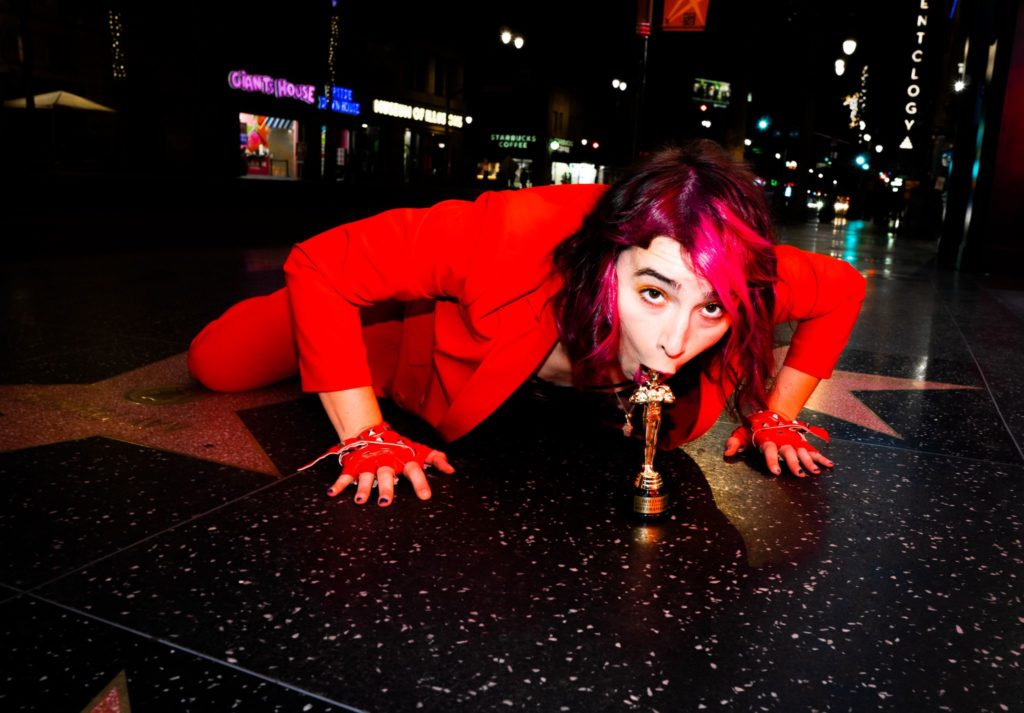
Photos by Sophie Prettyman-Beauchamp.

